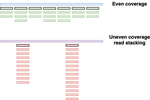Maxime Borry, PhD.
Bioinformatics scientist
Developing Bioinformatics statistical tools and workflows for scalable and reproducible, and actionable results.
Maxime Borry, PhD.
Max Planck Institute for Evolutionary Anthropology
Hey there,
I am Maxime, a Bioinformatics scientist specializing in the development of statistical tools and workflows for the analysis of omics data. I have extensive experience working with prokaryotic, eukaryotic, and human systems, and I excel at transforming complex biological datasets into scientific results through rigorous approaches and scalable bioinformatics solutions.
After an undergraduate degree in biology, I initially pursued studies in population and environmental sciences. After realizing I wanted to focus more on statistics and data analysis, I returned to complete an M.Sc. in Bioinformatics.
I completed my PhD in the Microbiome Sciences research group at the MPI-EVA, studying ancient DNA metagenomics, and continued this work as a postdoctoral researcher at the Leibniz-HKI with a focus on fermentation microbiomes. Recently, I transitioned to computational oncology and cancer research, focusing on personalized cancer vaccine development and the analysis of cancer genomics datasets.
- Bioinformatics
- Metagenomics
- Machine Learning
PhD candidate in Bioinformatics, 2018-2023
Friedrich-Schiller-Universität Jena 🇩🇪
M.Sc. in Bioinformatics, 2016-2018
Université Paris Diderot 🇫🇷
M.Sc. in Ecology and Environmental sciences, 2014-2015
Université Joseph Fourier, Grenoble 🇫🇷
Exchange Semester, 2013
University of Nordland 🇳🇴
B.Sc. in Life Sciences, 2011-2014
Université Paris Descartes 🇫🇷
Recent Publications
Experience
Accomplishments
Recent Posts
A few other projects I’ve done
(more on GitHub)



